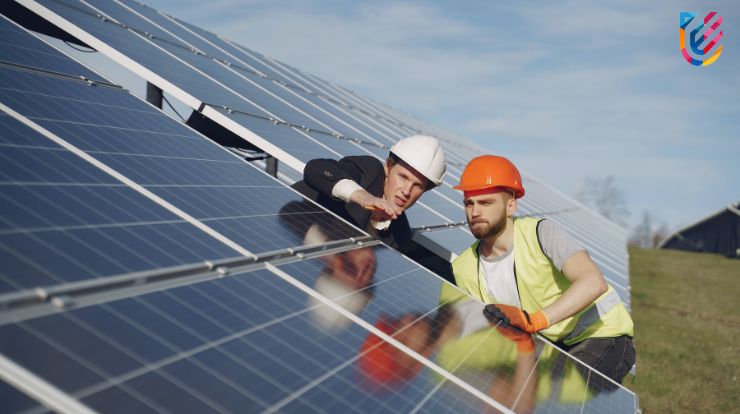The Future of Oil and Gas: Innovations in Exploration and Production

Table of Contents:
- Future Technology in Oil & Gas
- Future Prospects of Oil and Gas Industry
- Development Process of Oil and Gas Exploration and Production
- Conclusion
The future of oil and gas is vital as the world faces unprecedented challenges regarding energy transition, climate change, and global demand and supply trends.
For many years, the oil and gas sector has served as the economic engine of the entire world by supplying the energy inputs required to support the expansion and development of the industrial sector.

Future Technology in Oil and Gas
The technology trends in the oil and gas industry are rapidly evolving, driven by the need to improve efficiency, reduce costs, and address environmental concerns. Here are some of the future technologies that will shape the industry:
A. Advanced seismic imaging
The development of high-resolution photographs of the underlying geology made possible by advanced seismic imaging aids in discovering new oil and gas reserves. This technology is anticipated to lower costs, increase exploration efficiency, and lessen the adverse effects of drilling on the environment.
B. Artificial intelligence and machine learning
Oil and gas exploration and production will benefit greatly from artificial intelligence and machine learning technologies. These technologies can improve well drilling and completion, forecast and analyze data, and increase the efficiency and safety of operations.
C. Robotic exploration and drilling
Drilling and exploration activities will be safer and more productive thanks to robotic technology. Robotic systems can work in challenging conditions, require less human involvement, and increase the accuracy of drilling and completion.
D. Nanotechnology and Nanosensors
Nanotechnology and nano-sensors can improve exploration and production, delivering precise and timely data on reservoir features. As a result, this technology can lessen the environmental impact of exploration and production, increase drilling efficiency, and lower prices.
E. Use of drones for exploration and surveillance
Drones can investigate and monitor reservoirs, pipelines, and oil and gas facilities. They can deliver sharp pictures, find leaks and anomalies, and boost operational efficiency and security.
F. Digitalization and automation
Digitalization and automation are expected to transform the oil and gas industry, improving safety, lowering costs, and optimizing processes. These tools can deliver real-time data analyses, automate repetitive procedures, and enhance decision-making.
G. Enhanced Oil recovery techniques
Through enhanced oil recovery techniques, existing reservoirs can be exploited to extract more oil. These methods can prolong the life of oil fields and boost production rates while lowering operational expenses.
H. Carbon capture and storage
Oil and gas extraction will be less detrimental to the environment using carbon capture and storage technology. This technique captures and stores carbon dioxide emissions in geological formations, lowering greenhouse gas emissions.
I. Hydrogen and renewable energy integration
Integration of hydrogen and renewable energy sources will be crucial in lowering the oil and gas sector’s carbon footprint. In addition, this technique lessens dependency on fossil fuels by utilizing hydrogen and renewable energy sources to power oil and gas operations.
J. Chemical and material innovations
Innovations in chemicals and materials are predicted to increase the effectiveness and security of oil and gas operations. These developments include the creation of brand-new lubricants, coatings, and materials that can survive challenging conditions and minimize equipment wear and tear.
Future Prospects of the Oil and Gas Industry

The prospects of the oil and gas industry are evolving as the world transitions towards renewable energy sources and green technology in the oil and gas industry. Here are some of the prospects:
A. Renewable energy integration
The oil and gas sector is anticipated to include geothermal, solar, and other renewable energy sources. Increased efficiency, a diversified energy mix, and a decrease in greenhouse gas emissions are all benefits of this integration.
B. Sustainable practices and ESG standards
Environmental, social, and governance (ESG) standards and sustainable practices are gaining importance in oil and gas. Businesses are adopting these strategies to improve social and community ties, reduce environmental impact, and strengthen corporate governance.
C. Energy efficiency and carbon footprint reduction
The sector is concentrating on lowering its energy consumption and carbon impact through green technologies and energy-efficiency measures. As a result, the industry’s sustainability and environmental effect will increase due to this focus.
D. Investment in research and development
The future of the sector depends on investment in research and development. The industry will benefit from this investment by developing innovative technologies and procedures that increase productivity, lower costs, and promote sustainability.
E. Shifting global demand and supply trends
The sector must adapt to changing worldwide patterns in demand and supply as nations change their energy policies and diversify their energy sources. By emphasizing cost-effectiveness, innovation, and sustainable practices, the sector must adjust to these shifts.
F. Geopolitical and regulatory challenges
Geopolitical and regulatory challenges such as trade disputes, sanctions, and climate policies will impact the industry’s prospects. Companies must navigate these challenges by adopting sustainable practices, diversifying their operations, and developing new technologies.
Development Process of Oil and Gas Exploration and Production
The development process of oil and gas exploration and production constantly evolves with innovation in the oil and gas industry. Here are some of the development processes:
A. Seismic Imaging
Seismic waves are used in the seismic imaging method to map the earth’s subsurface. Thanks to significant technological advancements, images of underground reservoirs are far more precise and detailed. This invention lowers drilling costs and improves exploratory success rates.
B. Horizontal Drilling
Oil and gas are extracted from reservoirs using the horizontal drilling technique because they are difficult to access using vertical drilling methods. With this invention, drilling has a minor negative environmental impact while production efficiency has grown.
C. Enhanced Oil Recovery (EOR)
The oil and gas sector uses enhanced oil recovery (EOR) methods, including more frequent carbon capture, storage, and hydraulic fracturing. These methods lessen production’s environmental impact while increasing oil and gas recovery rates.
D. Automation and Robotics
Automation and robotics are increasingly used in the oil and gas sector to increase productivity and cut costs. As a result, drilling, production, and maintenance operations can be safer and more productive thanks to these technologies.
E. Digitalization and Data Analytics
Due to digitalization and data analytics, oil and gas exploration and production are becoming more efficient and productive. In addition, these innovations aid in cost-cutting, increased safety, and operational optimization. As a result, predictive analytics and real-time monitoring are becoming increasingly crucial in the sector.
Conclusion
The oil and gas industry trends are rapidly evolving with new technology trends, green technology integration, and innovation in the exploration and production process. The industry’s prospects for the future depend on its capacity to implement sustainable practices, invest in R&D, and overcome regulatory obstacles.
Recommended Blogs

7 Surprising Benefits of an MBA in Oil and Gas Management
An MBA in Oil and Gas Management helps you advance your career with Leadership Skills, Networking, Global Knowledge, Professional Growth.
Read MoreMar 15, 2024 I 2 minutes
45+ Business Development Interview Qs! (Basic, Concepts, Tech)
Master your Business Development interview prep with 45 most asked questions for freshers, experienced & techies. New Questions updated!
Read MoreFeb 16, 2024 I 10 minutes
Introduction to Renewable Energy Management: What You Need To Know
Discover what is renewable energy management, its importance to the world and the key aspects of managing these energy sources.
Read MoreJan 20, 2023 I 2 minutes
Ace Your Data Governance Interview with these 55 Question Types
Master 55 data governance interview Questions, from data lineage puzzles to AI challenges. Sharpen your skills & land your dream data role.
Read MoreJan 21, 2024 I 15 minutes


